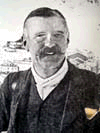
The zoologist in question is Dr. George Herbert Fowler, who founded of the Bedfordshire Record Office (now Bedfordshire Archives) and became the pioneer of local record offices in the United Kingdom. A man of many talents – his various accomplishments included being an expert downhill skier – he retired from a position as assistant professor of zoology at University College London and settled at Aspley Guise in Bedfordshire. Throwing himself into the life of the county, he served on the Bedfordshire County Council where he became interested in historical records and concerned that the county records should be carefully preserved. This led to him founding the Bedfordshire Historical Record Society in 1912 and the Bedfordshire Record Office in 1913. During the First World War he worked for the Admiralty in hydrographic and naval intelligence, but continued his historical work and (in typical Fowler fashion) as a sideline served as the head of the local volunteer fire service. He transcribed and translated many of the earlier medieval documents relating to Bedfordshire, making them available through the early volumes published by the Bedfordshire Historical Record Society. He also pioneered the conservation of documents, experimenting with different techniques in his workshop. In 1923 he published The Care of County Muniments, the first manual setting out the principles of caring for local archives. He remained directly involved in the work of the Bedfordshire Record Office until his death in 1940.
Dr. Fowler’s legacy lives on, not just in Bedfordshire Archives, which celebrated its centenary in 2013, but in the network of county record offices which provide a comprehensive archive service for the United Kingdom. His ideas spread, and staff trained by Dr. Fowler were involved in the foundation of other county record offices. For example, his protegé Frederick Emmison left Bedfordshire to become the first county archivist for Essex in 1938. Conservation techniques he pioneered are still in use, with some of his equipment still gracing the conservation studio at Bedford. After 104 years the Bedfordshire Historical Record Society continues to publish records relating to the local area, as do many other historical societies across the country.
And so this series of A to Z posts on archives has come full circle, arriving back at the beginning with the early days of some of the archives I mentioned in A is for Archives. If you have read this far, thank you for joining me on this journey through the archive alphabet.

Kathryn, this whole series has been wonderful! You have the most fascinating job!
LikeLike
Thank you! It really is 🙂
LikeLike
Congratulations on completing the Challenge and coming full circle!
LikeLiked by 1 person